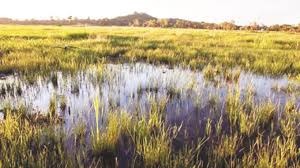Environmental activists and stakeholders are calling for a re-mapping of Harare’s wetlands, which serve as critical water sources for the capital city.
The urgent plea follows increasing reports of unplanned developments and urban farming, which are contributing to the destruction of these vital ecosystems.
Harare is home to 47 gazetted wetlands, including three internationally recognized sites under the Ramsar Convention: Lake Chivero, Cleveland Dam, and Monavale Vlei.
Despite their protected status, stakeholders warn that these wetlands continue to face significant threats, stressing the need for closer monitoring through a comprehensive re-mapping exercise.
Harare Wetlands Trust (HWT), Programmes Manager Selestino Chari, highlighted the importance of an all-stakeholders approach to address the issue.
“There is need for responsible authorities to invest in research and development and be more scientific in terms of the significance of wetlands so that communities get to see the economic value of wetlands,” Chari said.
He proposed a collaborative approach, suggesting that a “one-stop shop” be established where stakeholders such as the Environmental Management Agency (EMA), the City of Harare, the Zimbabwe National Water Authority, Upper Manyame, and civil society can collectively oversee the re-mapping process.
This would involve ground-truthing and assigning value to each of the 47 wetlands, allowing communities to better appreciate their significance.
Chari also addressed the contentious issue of private ownership of wetlands, which has often hindered conservation efforts.
He urged the government to create a compensation framework for private wetland owners, acknowledging that failing to address property rights could lead to continued conflict between development and environmental protection.
“As long as we don’t address that issue, then there is a fight between property rights and environmental rights, and we will still continue to have a problem. There is a need to come up with a framework for compensation of people who own the wetlands,” Chari said.
At a recent event hosted by the Food and Agricultural Organisation (FAO), Leon Mutungamiri, a representative from EMA, signalled the agency’s openness to re-mapping Harare’s wetlands.
He noted that since the beginning of 2024, EMA had already rejected 14 housing projects because the proposed development areas were on wetlands.



